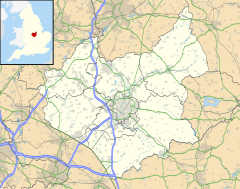Norton-juxta-Twycross
Norton
|
|
|---|---|
 Entrance Sign to the village, with the Church in the background. |
|
| Norton shown within Leicestershire | |
| Civil parish | |
| District | |
| Shire county | |
| Region | |
| Country | England |
| Sovereign state | United Kingdom |
| Police | Leicestershire |
| Fire | Leicestershire |
| Ambulance | East Midlands |
| EU Parliament | East Midlands |
| UK Parliament | |
Norton Juxta Twycross, usually known as simply "Norton" (or "Norton-Juxta"), is a small village in Leicestershire, England. The village is part of the parish of Appleby Magna, with the vicar based in Appleby. The population is included in the civil parish of Twycross.
The village has traditionally, and historically, been known as "Norton": deriving from the Anglo-Saxon, meaning "North-Town"; with variable spellings including "Northton" and "Nortone". The village, however, was also known for a brief period in the 17th century as "Hoggs Norton". The village's current name was acquired to differentiate the village from the several others in the county named . "Juxta" is Latin for "near", and Twycross is a small village approximately 2 miles southeast of Norton.
The village of Norton is thought to have been founded in the 8th or 9th century by the Anglo-Saxons. The Anglo-Saxon King Æthelred granted the village a charter in 951, referring to it as "Northton"
The village is listed in the Domesday Book as "Norton", and the Lord of the Manor was recorded in both 1066 and 1086 as Countess (Lady) Godiva, widow of Leofric, Earl of Mercia, famed (legendarily) for riding naked around the streets of Coventry. In both 1066 and 1086 the village is recorded as worth £0.3. The village is listed as a very small settlement, with only four households, but has a quite large taxable value of 6 geld units. The Domesday Book records the village as home to 1 villager, 2 small holders and a priest, and is recorded as having land for 7 ploughs and 8 acres of meadow.
In 1325 several people in Norton were arrested for the murder of Sir William de Monte Gomeri, which took place near to Merevale Abbey. Philippa, widow of the murdered Sir William, said that it was in the manor house at Norton, belonging to Walter de Monte Gomeri(unclear how they are related; may have been brother of deceased), that Robert de Gresley had sent his brother Peter to kill her husband. He was struck over the head by a sword, and died in Phillipa's arms. Philippa accused Joan, wife of Walter de Monte Gomeri of also being present at Norton Manor during that meeting, and of "aiding, abetting and procuring the death of her husband".
Robert and Joan appeared before the County Court and were transferred for trial at the Court of King's Bench. Both stated they were not guilty but only Joan was given bail until the trial. The jury of their trial returned a not guilty verdict for the pair. Peter de Greseleye and another supposed accomplice William de Northfolk, both failed to appear before the County Court and were declared outlaws.
...
Wikipedia

